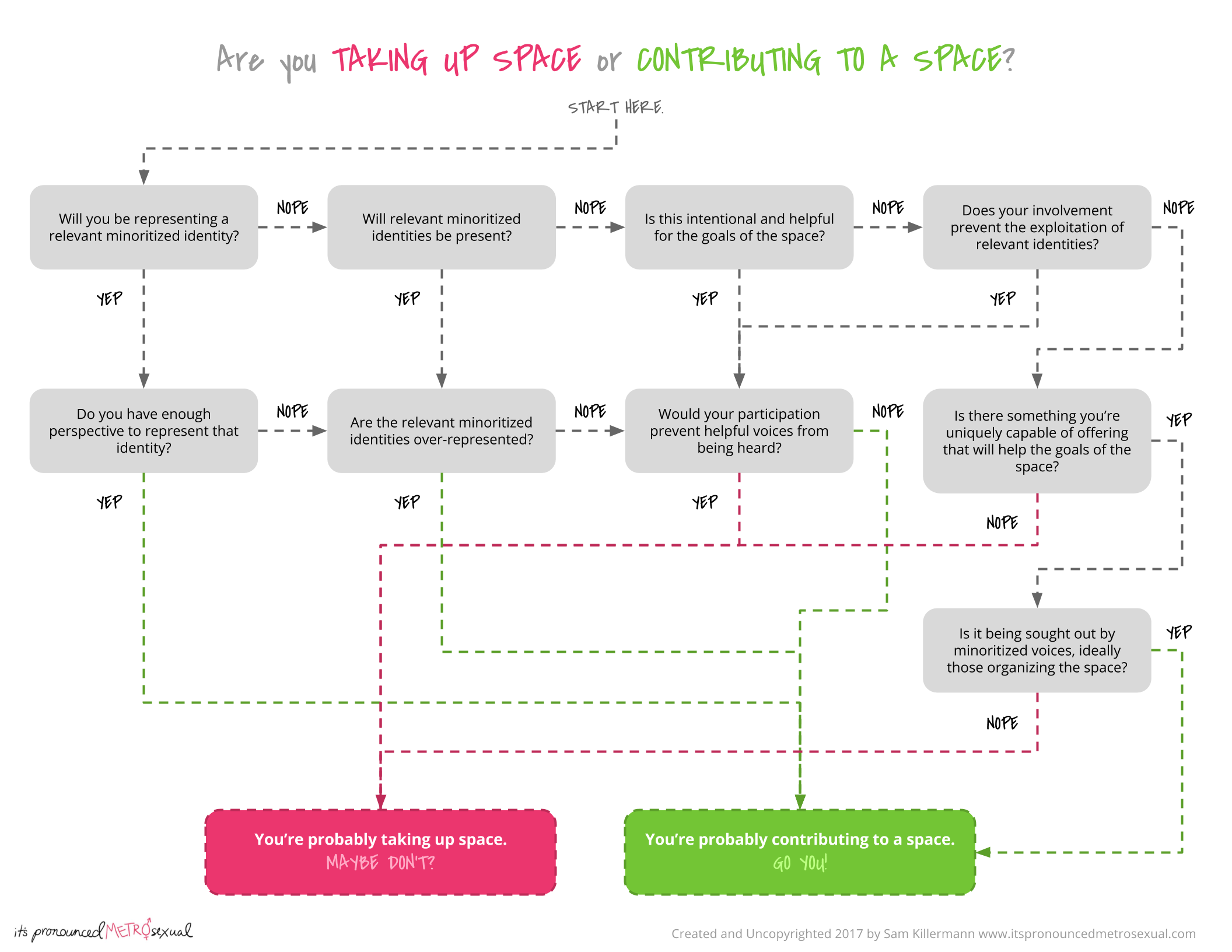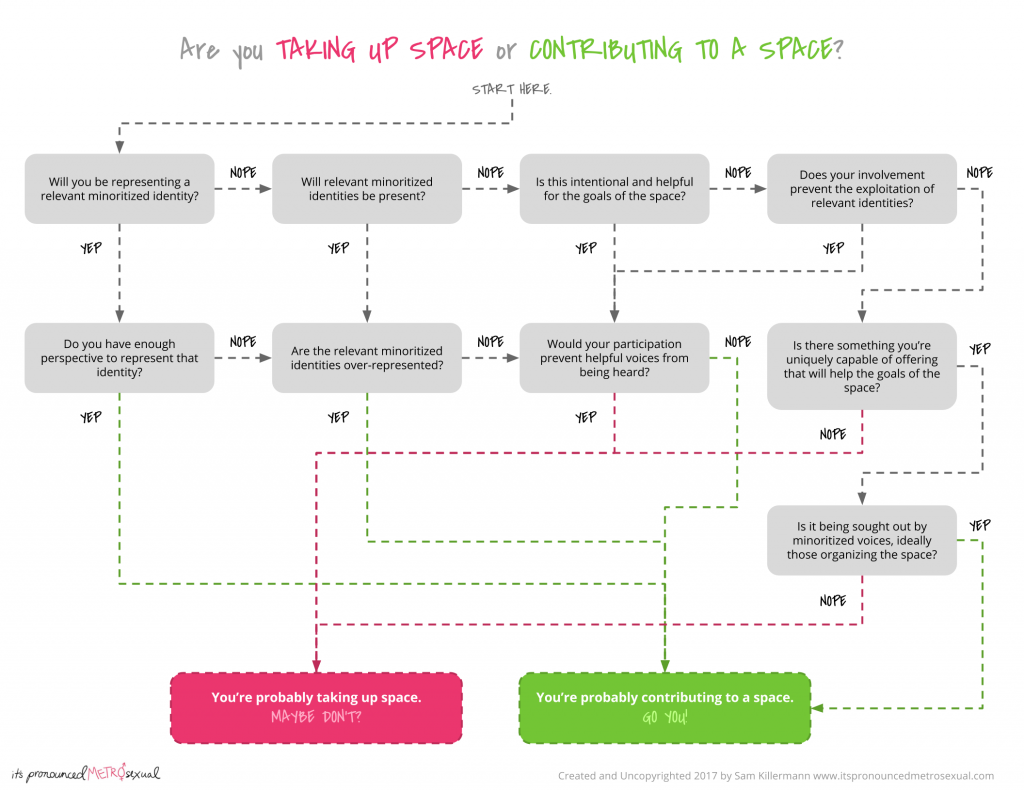A lot of us want to just “be people,” and leave our social identities at the door when we enter a room. In September 2016, I was asked to participate in Katie Couric’s “Gender Revolution” documentary (by National Geographic). The following questions were what I worked through — and what I generally work through — when deciding to say “yes” or “no.”
The questions below help me answer a general question: “Will I be taking up space, or adding to the space?” But before we get to these questions, I want to first clarify what I mean by this distinction, and why it’s important in a social justice integrity framework.
Taking up Space vs. Adding to a Space
The potential conflict rests with the social identities that comprise us, and how those identities may contribute to or detract from a space. There are two angles to this.
The first angle is recognizing that we’re not _just _our identities. We’re as much a product of the ways they intersect, as the identities that are intersecting themselves. I share this first to reassure the “I just want to be a person crowd,” because this half is easier for a lot of us to own. You Soup is helpful for diving into this.
The second angle is recognizing that we do represent our social identities, wherever we go, and in whatever spaces we occupy. Whether we want to or not, it’s impossible to fully separate ourselves from our social identities, and the implications thereof. And in some spaces, particular social identities will be particularly important (or salient), so it’s important to consider how we’re showing up.
For example, if we are the only person who holds a particular minoritized (i.e., oppressed, targeted) or majoritized (i.e., privileged, dominant) identity in a space, that will lend itself to potentially harmful “spokesperson”-ing. Or if we’re in a space where a particular dimension of identity is in focus (e.g., a gender-focused space), that aspect of ourself will hold particular weight. And all of that is true whether or not we want it to, and regardless of all the intersections of identity that comprise us (unfortunately).
“Taking up space” is not helpful. You might think of it of as someone (generally who holds a majoritized identities) who is occupying a setting (a training, a meeting, an event, a project) to the detriment of others, _and _to the detriment of the goals of the space — within a framework where the intended outcomes in some way advance social justice. (i.e., if your goal is an oppressive organization, a bunch of rich, white, man people creating a bank would be perfectly achieving that goal).
“Adding to a space” is helpful. You might think of it as the opposite of above: someone occupying a setting to the benefit of others, _and _to the benefit of the goals of the space. Considering that person’s social identities, and how they are wielding them, they are uniquely contributing in a way that advances social justice, and doesn’t erase, talk over, or distract from other helpful voices, or generally creates harmful outcomes.
We don’t have control over how other people see us, but we have some control over when, where, and how we choose to show up.
One last thing: this is not neutral. There are clear value statements made in everything I’ve written so far. A lot of “inclusivity” convos online present an idea of absolute, impartial inclusivity (e.g., that all voices should be heard and considered in every space). But if your goals are social justice, impartial inclusivity can often result in negative outcomes.
In considering participating in Gender Revolution it was important for me to be sensitive to my majoritized gender identity (because of the gender theme), as well as the ways other majoritized identities I hold (because of the general activism and social justice themes) — and what the implications of those identities would say about my involvement.
Questions I ask myself, and the others involved
Okay, so the questions. Following are some of the questions I ask with the hopes that I navigate any situation in a way that fits within a socially just framework of integrity. Sometimes the answers result in my bowing out; other times they lead to me stepping up. The important thing for me is not asking them searching a particular answer, but being ready to let the answers guide my participation (or non-participation).
What are the goals of the space?
In a perfect world, what would the outcomes be for this thing? Does my participation align well with those goals?
For example, is the goal educational? If so, I consider what specific learning is meant to take place, and how I may contribute to or detract from that learning.
Who else is going to be involved?
In what ways will other folks with other [sets of] social identities be participating? And what roles will they have? (considering prominence, input, focus on their voice, and leadership in determining the message)
Who isn’t going to be involved (or who’s excluded)?
If I don’t participate, or in general, what social identities will be absent? How does their absence affect the outcomes of the space? Can my opting in affect this in a positive way? (e.g., adding a voice that is both helpful and wouldn’t otherwise be represented) Or could my opting out affect this in a negative way?
Connected to this: are there ways I can use my opportunity to be involved to recommend, refer, or redirect to other people who should be, and aren’t?
Am I comfortable or willing to show up (in the ways I’m being asked, or in general)?
If I’m being sought out for a particular identity, am I up for having this aspect of myself magnified (at the risk of tokenization)? Am I comfortable speaking to this aspect of myself, or would I rather let others do so?
And maybe I wouldn’t be comfortable, but could my showing up prevent someone else from being [further] exploited? Is this space inherently more risky for some than others (e.g., a white person filing a complaint against a racist superior/organization/setting, compared to a person of color filing the same complaint)?
Most importantly (for me): Am I uniquely qualified to occupy this space (based on the goals), such that I couldn’t recommend someone I know? Just because I represent or hold a specific identity (e.g., I’m poor/working class) doesn’t mean I’m well-suited to speak about it (in this case, I don’t have a solid-enough grasp of classism, relevant theory and research, and the activism being done in this arena), so I’ll often refer away to someone who would be a better fit.
Finally, if I’ll be representing a majoritized identity, are minoritized identities already being disproportionately represented?
Maybe I’m okay with being the only representative of a majoritized identity (depends on the setting). I’m not, however, okay with adding to an already over-stacked roster of majoritized identities I hold, unless the goals of the space specifically call for this, and do so in socially just ways (e.g., caucus spaces). I don’t want to be the second, third, or seventh white person on a panel about racism. I may not even be able to add to that panel at all (and end up
For example, if the space is gender-focused and I’m asked to show up because of my cisgender man identity, the first question I’ll ask is “Are trans* people, non-binary people, and women already more represented than they are in society-at-large?” If not, are there other ways (additional spaces being offered, either at the same time, before this, or after) where that will be happening?
Putting all of these questions together…
I end up with an algorithm that looks something like this:
- If there will be other voices adequately represented; and
- My participation will add a unique voice that is helpful to the goals; and
- I’m comfortable, willing, and uniquely able to show up in that way; and
- Minoritized identities are being disproportionately represented (or have been, or will be);
- Then I might be able to contribute to this space, instead of taking up space.
Are you willing to make mistakes?
None of the above, or literally anything I’ve ever written, is fool-proof. The ultimate question when it comes to “taking up space” versus “adding to a space,” is exactly this: are you willing to make mistakes?
If you’re not willing to make mistakes, and to learn from them, there’s not much hope for navigating this maze, minefield, and important (but oh so tricky) question.
But if you are, I trust that the above list will be helpful for you, as it has been for me, in exploring an opportunity and gauging whether or not — and, if so, how — to_ _show up in a space.
I use the above list (and other questions depending on the situation) whenever possible to vet every gig request I get. This sometimes brings about confusion (it’s considered, by some, to be unconventional), but it’s always clarifying. I don’t want to take up space. I’ll happily turn away an invitation if I get the sense that I’ll be taking up space, and I feel a million times better saying “yes!” when I sense I’ll be contributing to a space. There are too many other people doing amazing work, and I only have so much time to spend.
And if you’re still wondering, in regards to Gender Revolution, after (1) being assured I would be the minority in representing my majorized gender (cisgender man), (2) they were specifically asking me to be involved because of how I approach gender, not just to hear from a man, and (3) that trans*, non-binary, and women voices would be disproportionately represented, I agreed to be involved. As of the time that I’m writing this, the film isn’t out (it comes out February 6th, debuting on National Geographic at 9/8c), so I can’t yet know if these promises will ring true, and I was used in ways that align with my ethic.
That goes with something I said above: we can’t always know how we’re going to appear to others, but at least we can do everything in our power to choose how we show up. Then we can listen to the constructive criticism we get, run it by our allies, and let it inform our future actions.
I hope you choose to contribute. The world needs you.



